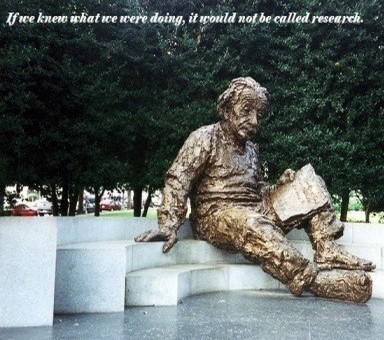This is a bit of a chicken and egg question; one that I have often asked myself … out of fear that I, guided by the theory, might not allow myself to see beyond my theoretical assumptions. Classic grounded theory research shares this concern. And so does the romanticised view that many early career researchers bring to the job and which is usually epitomised by this famous quote (attributed to Einstein):
If we knew what we were doing, it would not be called research.
Grounded theory points out that pre-defining a theoretical framework is inimical to generating new knowledge (see Glaser’s work), because of our theoretical bias. That, however, is to assume that new theories emerge from a vacuum and not from prior knowledge. And although starting data collection without a framework of reference may bear incidental learning that otherwise might not be captured, there is a lingering concern that such process may lack the depth that a theoretical framework is able to provide. Both approaches present vulnerabilities and are known for dividing the research community. Yet, I think both approaches are viable. What is important when doing research is to be able to justify our choices. This requires a reflexive endeavour to understanding the ‘researcher’s self’, i.e., our ontological, epistemological and methodological stances:
- the ontological question: the essence of reality under study (how I, as a researcher, see the world in which I attempt to develop new knowledge, both in its form and nature);
- the epistemological question: the essence of knowledge (how and where knowledge takes place, and what is the relationship between the knower and knowledge);
- the methodological question: the source and tool of new knowledge (the means through which new knowledge can be attained).
Being able to answer these questions is to learn where we stand; the philosophical quest of every researcher. I dwelled on this long enough during my PhD to then find out that my research paradigm aligned well with the Bourdieuian lens, i.e., that I see the world as a fluid social construction within structured, structuring and symbolic structures, and that knowledge is a contextual interpretation of such structures. His influence is so strong that it now informs, and influences, my perceptions of my day-to-day experiences. Nonetheless, this take on the social world did not materialise right from the onset of my research project; it rather emerged and matured through the process of collecting and especially analysing data, even though I did survey existing literature as Frances Bell points out here. What I realised was that the literature reviewed did not provide answers to the data I collected, thus creating the need to look for an analytical framework post data collection. Having said that, the literature review allowed me to create the background narrative that enabled my research project.
Now, post PhD, and after ‘discovering’ Bourdieu’s work, I face a different dilemma: that of allowing (or not) Bourdieu to frame my research. In the past I let Bourdieu help answer critical aspects of online practice that the learning technology literature had not anticipated. Do I now allow him to ‘ask’ the questions that frame my future research projects?











Thanks for this post, Cristina. It is really useful to read about other people’s journey through data collection, analysis and theory. One of the most difficult aspects I’ve found doing my PhD relates to the question (usually asked in an off-hand, conversation-starter way at conference dinners) “So, tell me, what is your theoretical framework for your PhD?”. It is only recently that I’ve come to feel comfortable with seeing the relationship between theory and data as iterative and realising that the questions about a chosen theoretical framework at the start of your PhD hints at certain views about the nature of ‘doing’ research.